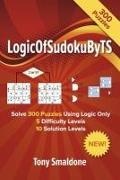Read more
What differentiates one Easy rated Sudoku puzzle from another; or one three out of five stars from another; or one Hard from another? Are puzzles from one source rated at a given difficulty level generally harder or easier than from a different source with the same difficulty level? How should one go about solving a Sudoku puzzle? So many questions.
>- All puzzles would be solvable by logic, and logic only, NO GUESSING.
- All puzzles would be solved as I would solve them by hand, using a methodical, logical approach defined in the solution levels. This gives them a personal touch.
- All puzzles would reflect visual symmetry, an accepted practice among Sudoku puzzles.
>If you're new to Sudoku this book is for you. You are assured that all puzzles can be solved using a methodical approach based on logic, and only logic. An excellent way to begin your Sudoku study. If you're already a student of Sudoku, this book is also for you. It will provide you with the opportunity to hone your existing logic skills and discover new ones. If you are a player who often guesses, you can be assured that these puzzles can (and I would argue, must) be solved by logic alone. To assist you, included is my 9x9 matrix that I used in my study, and which proved to be invaluable. Maybe it will help you too.
Become a disciple of Sudoku. Just remember, NO GUESSING. Only logic.
About the author
Tony Smaldone has a B.S. in Electrical Engineering, an M.S. in Applied Mathematics and is ABD for a doctorate. He has worked in industry for over 40 years; first as a technical and network engineer at a major computer company, then as an engineer and manager at a major defense contractor where his focus was on the development of a stochastic software model of a sophisticated radar and weapons system. Mr. Smaldone is also an adjunct professor of mathematics at a local college and a teacher of mathematics at a private Catholic high school. His interests include (not necessarily in any order) mathematical modeling, data analytics, data science, statistics, software design, logic circuits, and, of course, Sudoku.

